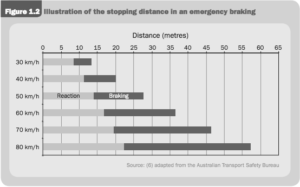Speed has consequences
We all know someone who likes to speed because he/she’s an experienced driver, and feels like he/she’s in control. But this does not always lead to good things, as about 1.25 million people are killed each year internationally because of traffic related accidents. This affects children walking to school, elderly crossing the road, people driving to work and all other road users. In 2015, 146 people died in crashes because of speeding, either travelling above the speed limit or too fast for the road conditions. Thousands of these people were injured, and will carry their injuries for life.
It’s time to do something. Accordingly, the United Nations General Assembly has taken action and will be holding their fourth United Nations Global Road Safety Week from May 8-14, 2017. This week of learning will focus on safe driving, and what can be done to prevent deaths and injuries. The powerful name of this campaign is self-explanatory: Save Lives, #SlowDown.
Decade of Action for Road Safety
On May 11, 2011, dozens of countries around the world kicked off the first global Decade of Action. The campaign operates on the principles of the Decade of Action for Road Safety 2011 – 2020. From New Zealand to Mexico and the Russian Federation to South Africa, governments are committed to taking new steps to protect lives on their roadways. The Decade of Action seeks to prevent road traffic deaths and injuries which experts project will take the lives of 1.9 million people annually by 2020. The #SlowDown campaign has been modeled after the Decade of Action for Road Safety – promoting the same principles that each organization holds dear.
“Every day we have good reasons to go somewhere important, whether we leave our homes for work, school or play. However, getting safely to where we are going is as important as getting there at all.”
Out of control
Speeding is a major risk factor. When the unexpected happens on the road, the speed that you’re travelling at matters a lot. ‘Just a little bit over the limit’ can be the difference between being able to stop in time or not at all. If the worst happens and there is a crash, any extra speed means extra impact force – and the human body can only tolerate so much before death or serious injury are inevitable. We need to be responsible when on the road, a mistake does not need to cost someone their life or well-being.
Is slowing down really safer?
The answer is yes. A 5% cut in average speed can result in a reduction of 30% in the number of fatal crashes. In fact, studies have proved wrong to a lot of common thoughts: mathematically, speeding only helps on long car trips. Unless you’re going on a really long car trip, the time savings for speeding are already pretty minimal. The most time saved on a trip shorter than 500 miles is about 12 minutes![1]
The ‘Slow Down’ campaign encourages drivers to reduce their speed because it’s difficult to know what is up ahead.
Get involved by taking the pledge here: https://www.unroadsafetyweek.org/en/get-involved


